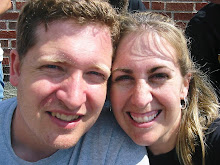I have been devoting almost all of my time to JNK (pronounced JUNK) lately. In my last post I mentioned that I had stumbled upon something interesting. The premise of the experiment was that we would compare the levels of JNK activity in cancerous tissue to non-cancerous tissue. Not too big a deal. JNK is a multi-tasking protein. Actually there are three JNK proteins. The ones I am concerned with are JNK 1 and JNK 2. They are very similar in sequence and are usually lumped together. The phospho-antibody I have to look at activating JNK is actually designed for both JNK 1 and 2 but I have separate antibodies for the inactive forms. JNK can be involved in cell suicide (apoptosis) or cell survival depending on the stimulus and cell type. We hypothesized that JNK activity would be increased in our tumor samples. That doesn't appear to be the case at first blush. I was a little disappointed at the results but it is what it is and I accept that. The interesting part came when I stripped the antibodies off the Western blot and re-probed for the inactive versions. What I found was that JNK 1 and 2 are being differentially regulated in these tissues. Attempting to find out why that might be, I searched the published literature and found a precedent for this in a paper published 5 years ago. We are working in completely different cells but it will be interesting to see if this plays out. The published paper showed that cells lacking JNK 2 proliferated more rapidly. Our tumors appear to have reduced JNK 2 expression. This is cool.
I am going back and re-running the Westerns, this time probing for the JNKs independantly. The JNK 1 blot I finished today was not very convincing. We will see what the JNK 2 says tomorrow. This could lead to a bunch on new experiements.
Tuesday, January 27, 2009
Friday, January 16, 2009
I have been chiding myself for not posting hear (get it?) more frequently. I am aware that 99% of anybody reading this blog probably doesn't really understand or perhaps even care (and that doesn't bother me; I am writing this more for me than for anyone else) what I am talking about and that is probably why I have been slacking. Another reason is that Biomedical research crawls forward at a glacial pace. It is rare that something new and ground breaking occurs. I figure that if I can have even a couple of those types of events occur in my career Iwill be pretty happy. Mostly, though, it is millimeter by millimeter that progress is made.
I mentioned the xenographs I was going to do in my last post. We finally performed the surgeries in December but with disasterous results. Out of the 16 mice we implanted, only three of them survived. I am not really sure why but I am guessing that it is a combination of anesthesia problems and internal bleeds. There are a couple of large arteries near the implantation site that I know in at least a couple of the mice were nicked. Placing the tumor next to one of those arteries within the cranial vault may also have caused the mouse to stroke out due to increased pressure on the artery. The human patient who so kindly let us have his tumor will be back in surgery in a few months so we will give it another try.
I just finished a Western blot that is quite interesting. I need to spend some time thinking about it before trying to describe the results. If what I think is occuring actually is occuring, I may have stumbled onto one of those moments - a small one but one never the less. One of my favorite things about biology is that there is always something new to think about and figure out.
I mentioned the xenographs I was going to do in my last post. We finally performed the surgeries in December but with disasterous results. Out of the 16 mice we implanted, only three of them survived. I am not really sure why but I am guessing that it is a combination of anesthesia problems and internal bleeds. There are a couple of large arteries near the implantation site that I know in at least a couple of the mice were nicked. Placing the tumor next to one of those arteries within the cranial vault may also have caused the mouse to stroke out due to increased pressure on the artery. The human patient who so kindly let us have his tumor will be back in surgery in a few months so we will give it another try.
I just finished a Western blot that is quite interesting. I need to spend some time thinking about it before trying to describe the results. If what I think is occuring actually is occuring, I may have stumbled onto one of those moments - a small one but one never the less. One of my favorite things about biology is that there is always something new to think about and figure out.
Subscribe to:
Comments (Atom)
